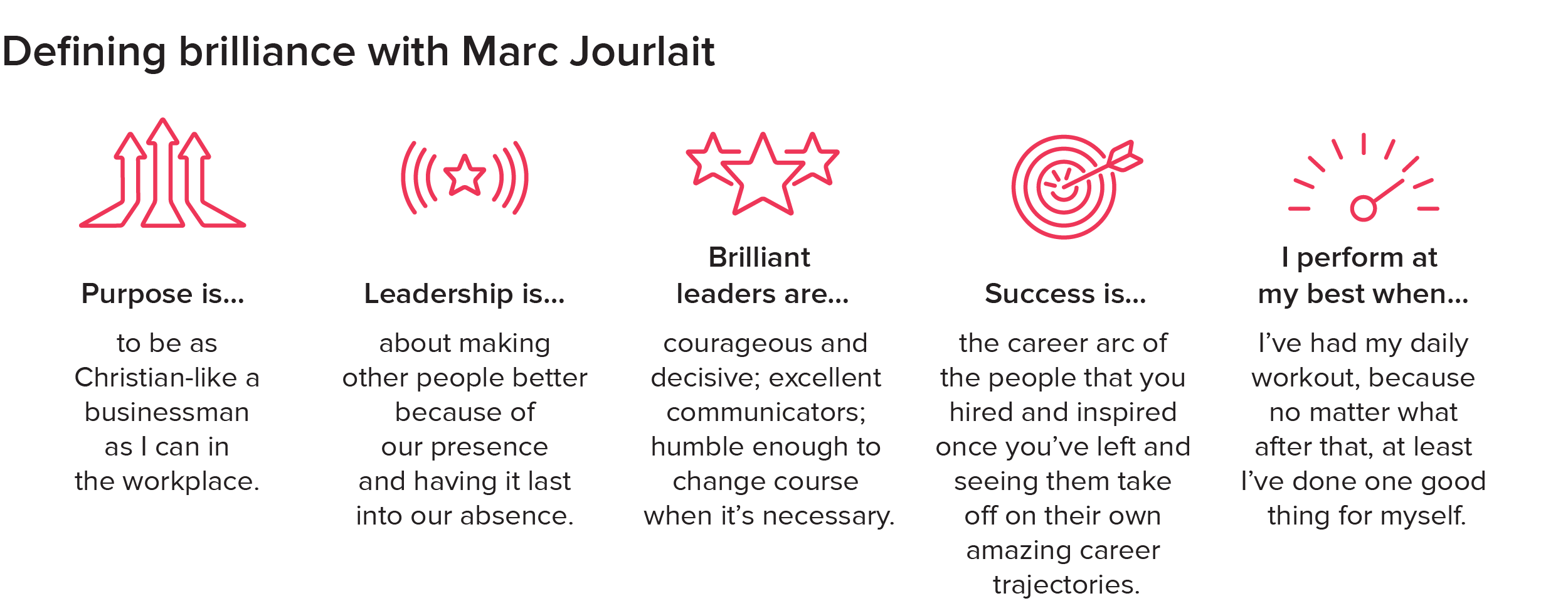Interviewed by Kevin O’Neill
Marc Jourlait is passionate about taking broken things and making them whole again. A serial CEO and private equity operator, his career weaves a compelling narrative of transforming shattered ambitions into resounding success stories, reigniting both performance and pride in people.
In 2020, Marc assumed the role of operating partner at The Riverside Company, a global investment firm with $14 billion in assets under management. The firm, lauded as Private Equity Firm of the Year by ACG for its deal activity last year, focuses on the smaller end of the middle market while embracing a full spectrum of investment strategies to drive transformative growth and lasting value for portfolio companies.
Marc's work centers on the Riverside Value Fund, which targets North American companies facing special situations and revenues exceeding $75 million. Across several exciting deals, he plays a pivotal role in driving operational improvements. He recently executed and integrated a significant add-on to form SCRAM Systems while stepping in as interim CEO.
Marc's path into private equity is unconventional. He is a serial CEO stemming from the tech sector with brands like Apple, HP, Bose, Navico, and Kodak Alaris. He penned the CEO offer at Kodak Alaris, which spun off from the original Eastman Kodak, after it declared bankruptcy. He was told ' good luck' and walked through the doors facing a massive business and cultural transformation. Under Marc's leadership, the team went on to have 27 consecutive months of beating revenues, EBITDA, and cash generation, something which had never happened in the history of the company before.
On this episode of the Brilliant People Podcast, Marc engages in a thought-provoking discussion with Kevin O'Neill, co-founder and managing partner at Acertitude. They delve into stories of remodeling messy organizations, transitioning from corporate to PE, and the art that is shaping engaged boards. Marc also shares takeaways from his bilingual, bicultural, multinational upbringing, and a life journey spanning cities like Toronto and Paris to Tokyo and Silicon Valley and now, Manhattan.
Powerful perspective
Kevin: Marc, you've accumulated degrees from institutions in more countries than most people have visited, let alone the ones you've lived in. How have you leveraged your diverse background as an asset in your career?
Marc: My dad was French and from Paris, while my mom was American and from New York. My own story began in Toronto, where I was born and raised in a fully bilingual and bicultural environment, and it continued with frequent relocations throughout my life.
My fascination with computers and games took root when I turned 10, around the same time Apple was founded. I saved up money from summer jobs to purchase my first computer, setting my sights on working at Apple someday. After completing business school in France and participating in an exchange program in Tokyo, I turned my childhood dream into reality. Having completed two summer internships at Apple France, I was hired straight out of business school as a product manager on high-end, portable Mac computers. It was a life-changing moment that would define much of the arc of my career, propelling me into the world of B2B and B2C technology companies.
My multicultural background has proven invaluable in my global and Pan-European roles. I can seamlessly shift between presenting myself as an American or a European. Well-versed in the history and tensions of Europe, I navigate interactions with passionate Southern Europeans and forthright Northern Europeans with ease. I also grasp the intricacies of Japanese culture, such as the importance of silence in meetings and respect for hierarchies.
In the global business arena, open-mindedness and cultural awareness are potent tools. I encourage all executives to draw upon their personal experiences as differentiators. Being attuned to people is the foundation of effective leadership.
Transferrable skills
Kevin: How did your transition from tech companies like Apple to a career in private equity come about?
Marc: My entry into private equity was serendipitous. A recruiter with a Norwegian fund was seeking someone with experience orchestrating business model transformations and cultural shifts to take over from a retiring CEO. My background with Bose put me on the radar. I dipped my toes in the water - and got addicted.
What compels me about private equity is its unmistakable clarity of purpose and transparency. Unlike the relentless pursuit of quarterly results on Wall Street, or dividends to sustain a family-owned business as a lifestyle venture, private equity defines success for investors five years down the line and crafts strategies to reach those goals. Governance is remarkably straightforward, and board dynamics are relatively smooth. This transparency eliminates the noise and confusion that often clouds decision-making in non-private equity-owned companies.
People playbook
Kevin: What is your approach when you step into a new deal?
Marc: In private equity value investing, our mission is to acquire undervalued assets and transform them for the better. It's akin to uncovering hidden gems within the business landscape, often obscured by operational and financial challenges, leadership issues, or general circumstances. All organizations can undergo trauma.
Yet, with meticulous analysis and strategic interventions, many of these organizations can be nurtured and revitalized. There is typically a five-year timeframe focused on transitioning from EBITDA 'X' to EBITDA 'Y', increasing valuation multiples, and reducing debt.
At the heart of this process is people. My first order of business is to assess and assemble a capable team. This includes pinpointing areas of dysfunction, clarifying roles, and addressing any collaboration gaps. Signaling a change in direction is imperative too; there's a new sheriff in town.
This should happen as early as possible, even during initial contract negotiations. For a first-time private equity ownership change, statistics show that about 80% of CFOs and 70% of CEOs don't make it. The industry demands a different clock speed, temperament, and skill set.
When it comes to analyzing leadership, the first few questions I ask myself are:
- Are the CEO and CFO an effective partnership worthy of retention? If not, I often step in as an interim CEO and initiate a search.
- Do the chief commercial officer, CHRO, and other top-line executives possess the requisite strength to drive the business forward?
- Am I going to get along with this person?
Most often, I look for seasoned PE CEOs who have had a few successful exits, but there are exceptions - you can find a seasoned CEO who has done turnarounds or performed very well, and ultimately, PE skills can be both taught and learned.
My hiring criteria is not solely based around functional expertise. For a CEO, or almost any hire, I let my CMO assess their marketing skills, or my CFO assess their financial skills.
As importantly, I look for leadership, chemistry, and style points. Could I be stuck on a plane and debate strategy at length with this individual - and enjoy the conversation? There is no magic formula; sometimes, it comes down to experience and intuition.
Once the right people are 'on the bus', we can drive the Value Creation Plan from Point A to Point B.
To use a Jim Collins "Good to Great" analogy, once the right people are 'on the bus', we can drive the Value Creation Plan from Point A to Point B. If we buy a company and people meet me early on, they know I'm not only going to be operating partner, but chairman of the board, therefore the CEO's boss. They need to prove to me quickly that they deserve to be on the bus for the whole ride.
New demands
Kevin: You've highlighted what you find most rewarding about PE. Was there anything that made the transition challenging for you?
Marc: Certainly, the role of an operating partner comes with its unique set of challenges. In this capacity, you are the steward of pension funds, college endowments, and substantial investments from high-net-worth individuals, all with a keen eye on returns. The expectation is not merely to excel as a top-performing fund for investor returns, but also to possess the financial prowess required to consistently acquire and transform companies into lucrative investments.
Operating partners contribute significant value, benefiting both deal team colleagues and portfolio company management teams. We have a responsibility to guide portfolio leaders in identifying growth opportunities, streamlining operations, and implementing best practices. For me, this means drawing on my experience in turning around distressed businesses and optimizing successful ones. Providing an unbiased assessment of challenges and enhancements expedites the value creation plan and fosters a culture of continuous improvement within the organization.
For CEOs contemplating a transition into private equity, I advocate several strategic steps. Building a robust network within the private equity community, seeking mentorship, and gaining a deeper understanding of the due diligence process are pivotal. It necessitates a willingness to adopt a longer-term perspective, diversity your skill set, and align your values with the firm's objectives. Navigating this dynamic landscape can be tricky, but proactively applying these strategies will instill greater confidence and fuel success.
Empower the board
Kevin: You've served on a lot of boards in a lot of countries. What's your most significant insight gained from these experiences?
Marc: My board journey began as an executive with a board role, albeit not a formal member. It didn't take long for me to discern the stark contrast between functional and dysfunctional boards.
The ideal scenario emerges when the board actively shapes decisions, supports decision-making processes, and guides long-term strategies, all without micromanaging day-to-day operations. Striking that balance is key.
My largest piece of advice, whether in the capacity of a chairman or board member, is the importance of speaking up.
Attending quarterly meetings without actively participating fails to honor the investment made to bring you on to the board. In the boardroom, it is necessary to voice your insights, share your experiences, and occasionally offer a contrarian perspective.
There's a magical dynamic when the chairman of the board serves dual roles as superior and mentor. I've been fortunate to have exceptional chairman mentors, and I aim to reciprocate by assuming a similar role with the CEOs I collaborate with. This means being a trusted confidant for discussing concepts, a receptive sounding board for ideas, and a supportive coach in challenging situations.
Final thoughts
Becoming a brilliant person at work in private equity requires assembling proficient teams, championing operational excellence, and fully engaging in the board room. These activities are united by one central theme: passion.
When you confront fix-it situations with infectious enthusiasm, you become an inspirational leader, igniting that same fire in those around you. Discover and nurture this inner passion, for it serves as the driving force not only for your personal success, but for inspiring others to join you in the pursuit of excellence.

Never miss insights
Stay in the know with our thought leadership
Kevin's thinking
Leadership
The Value Multiplier: Why Private Equity's Best CEO-OP Partnerships Start with the Right CFO
Jul 21, 2025

Sports & Entertainment
How Top CROs Are Unlocking New Revenue Streams in Sports – with Data and Collaboration
May 05, 2025

How to Foster Epic CEO Performance in a Private Equity Ecosystem
Jan 14, 2022

